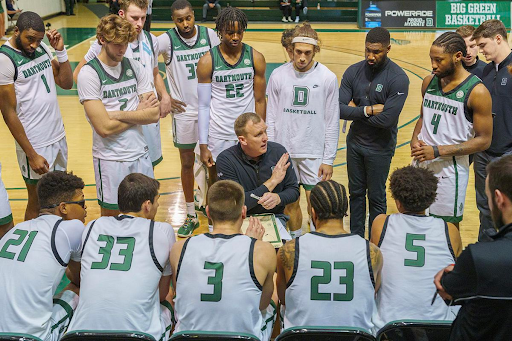
On Tuesday, March 5th, members of the Dartmouth Men’s Basketball cast their votes on a decision that is collegiate sports history in the making. These little slips of yellow paper are part of a larger movement in redefining what it means to be a college athlete. With a tally of 13-2, the “big green” players formed a union [1].
While the NCAA’s multibillion dollar model benefits coaches and universities, students are left unpaid. In the 2021 case NCAA v. Alston, the Supreme Court stated that the NCAA was breaking antitrust laws. Following this ruling, athletes have gained the right to profit off their public image and social media brand deals.
However, players remain unsatisfied, wanting to bargain rights from formal payment, to practice and travel scheduling, to health insurance. Players Haskins, working a 10 PM to 2 AM dining hall shift, and Myrthil, a gym desk employee, stated that their rights to compensation “would alleviate the need for second jobs and enhance [their] experience as part of the Dartmouth benefits” [5]. Furthermore, healthcare assurance would ease the exorbitant costs sustained from playing injuries.
The greatest debate currently lies in defining collegiate athletes as employees. A month prior to voting, the team had filed an appeal to the National Labor Relations Board; on February 5th, a federal official declared that the team were official university employees. Laura Sacks, a National Labor Relations Board director, determined that the school had “the right to control the work” of the players “in exchange for compensation” such as the 6 pairs of university issued shoes or tickets provided to friends and family [2].
This case seems to mirror the “almost” union: in 2014, the Northwestern football team argued that their payment of athletic scholarships qualified their right as employees, thereby upholding the ability to unionize [1]. However, after being declared as employees, the National Labor Relations Board declined to review the team’s bargaining rights and the votes were effectively destroyed.
Like the ruling from a decade ago, the actual impacts of the vote are uncertain. The team must request greater review with the National Labor Relations Board after regional director Sacks’ ruling [3]. In the case that Dartmouth refuses negotiation, the case can be taken to a federal appellate court. Dartmouth’s lawyers have continually fought back against their students, insisting that since the Ivies do not provide athletic scholarships, there is no bargain over employee payment.
Regardless, the basketball players remain optimistic in creating a just model for future collegiate athletes, even stating their wishes to form an Ivy League Players Association [4]. Forward Haskins states “Dartmouth seems to be stuck in the past. It’s time for the age of amateurism to end” [3] and furthermore affirms “we’re closer than we started” [2].
[1]https://www.nytimes.com/2024/03/05/us/dartmouth-basketball-union-athletes-employees.html
[2] https://www.nytimes.com/2024/02/05/business/dartmouth-basketball-nlrb-union.html
[3] https://swimswam.com/dartmouth-mens-basketball-team-votes-to-unionize/
[4]https://apnews.com/article/dartmouth-union-ncaa-basketball-players-2fd912fade62ffd81218a6dc91461962
[5]https://www.npr.org/2024/03/05/1235877656/ncaa-dartmouth-mens-basketball-union-election-nlrb
[6]https://www.midmajormadness.com/2023/9/14/23873501/all-15-dartmouth-mens-basketball-players-file-to-unionize-with-nlrb
